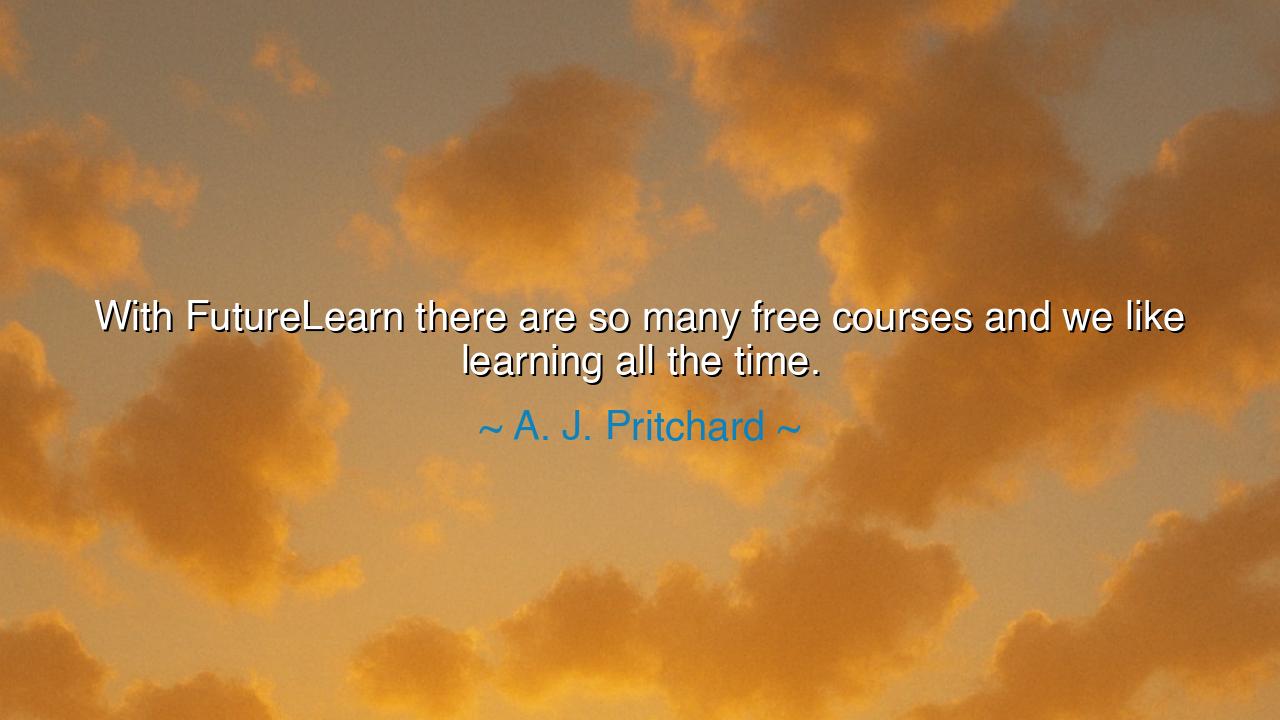
With FutureLearn there are so many free courses and we like






In the marketplaces of wisdom, a new herald cries: “With FutureLearn there are so many free courses and we like learning all the time.” Thus speaks A. J. Pritchard, and though the tongue is modern, the heart is ancient. Here is the old road of the libraries reborn under electric lamps, the academy unbound from stone walls and opened like a well to the square. The phrase carries two banners—abundance and habit: there is much to drink, and we drink all the time. What temple could be nobler than a gate that never closes?
Mark the double grace in these words. First, free courses—knowledge unshackled from tolls—echo the elder belief that wisdom should be bread, not jewelry. Second, a love of learning made continual—“all the time”—turns education from an event into a way. When these graces meet, a soul becomes weathered like oak: not brittle from rare storms of effort, but seasoned by many small rains. Platforms like FutureLearn are not merely shelves; they are rivers, and the wise step into them daily until the current carries them farther than they first imagined.
The origin of such a saying lies in the great democratization of study. Once, the scrolls were guarded by thresholds of coin and caste; now, the gate swings on invisible hinges, and multitudes pass through at dawn. Yet the ancients would warn: abundance without discipline becomes noise. To feast on courses is good; to digest them into skill is better. The proverb, then, is a summons to rhythm—to choose, complete, reflect, apply, and repeat—until learning is braided with living.
Consider a story to anchor this truth. In the nineteenth century, a Scottish millworker named William Lever spent his evenings in free public lectures and mechanics’ institutes, where industry met inquiry. He rose from clerk to founder, from narrow means to broad philanthropy, because he married constant learning to patient practice. Replace gaslight with fiber-optic, chalk with video, and his path is ours: a worker’s hour harvested after dusk, a lesson mastered on the tram, a certificate earned at the kitchen table—these are the bricks from which futures are laid. The old ladder stands; FutureLearn sets it in many places.
And another page from history: when Benjamin Franklin formed his Junto, a small society of artisans and tradesmen, they met weekly to debate, read, and refine themselves. Their learning was not hoarded; it irrigated their crafts and city. So too today, a cohort gathered around a free course—commenting, questioning, sharing notes—becomes a modern Junto. The platform provides the meadow; the people make it a commons. In such circles, knowledge grows legs, walks into workshops, startups, clinics, and classrooms, and does not return empty.
What lesson do we pass to our apprentices? That learning is not an age but a posture; not a staircase to climb and abandon, but a road that accompanies us. Let the abundance of free courses humble and hearten you: there is more to know than your lifespan can hold, and yet enough to change your life by nightfall. Choose one stream and drink it dry; then choose another. Measure progress not by the height of your titles but by the breadth of what you can now give to others.
Take these practical steps, simple as a monk’s rule: (1) Set a weekly learning hour that cannot be stolen—same day, same bell. (2) Pick one FutureLearn course at a time; finish what you start. (3) After each module, make one page of notes that ends with “Therefore I will…” and name a single action. (4) Teach a fragment of what you learned to a friend or colleague within 48 hours—teaching hammers knowledge into form. (5) Every month, reflect: which free courses sharpened your craft, which deepened your character, and which should be pruned? Walk this way, and your mind will grow like a garden tended daily—quietly, inexorably, beautifully—until others shelter beneath its shade.






AAdministratorAdministrator
Welcome, honored guests. Please leave a comment, we will respond soon